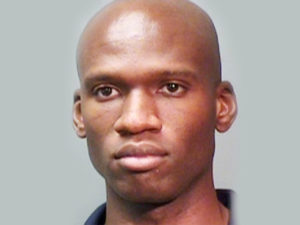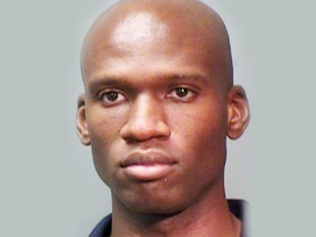
Authorities also released video footage showing Alexis methodically moving through the corridors of the Navy Yard building, looking for random employees to shoot.
“Ultra low frequency attack is what I’ve been subject to for the last three months,” Alexis wrote in one document found by investigators, according to Valerie Parlave, the assistant director in charge of the FBI’s Washington field office, who spoke to reporters at a news conference Wednesday.
“And to be perfectly honest, that is what has driven me to this,” he wrote.
Parlave said Alexis indicated “he was prepared to die in the attack and accepted death as the inevitable consequence of his actions.”
Alexis even etched out messages on his sawed-off shotgun about electromagnetic waves. Parlave said the phrases “my elf weapon,” “end to the torment,” “not what ya’ll say” and “better off this way” were etched into the side of the shotgun that he used to kill many of the victims.
Alexis’ employer, a computer services company called The Experts, spoke to him on Sept. 13, three days before the shootings, about a “routine performance issue,” and law enforcement officials said they did not believe that discussion had anything to do with the shootings.
But after the FBI’s news conference, Hewlett-Packard Company, the principal contractor for computer services work at the Navy Yard, announced that it had terminated its relationship with The Experts.
Hewlett-Packard’s director of global contingent labor, Henry Dreschler, sent a letter to The Experts chief executive, Thomas E. Hoshko, saying Hewlett-Packard “has lost all confidence in The Experts’ ability to meet its contractual obligations and serve as an H.P. subcontractor.”
Hewlett-Packard spokesman, Michael Thacker, in an e-mail to the New York Times said, “Based on what we now know about The Experts’ conduct, including its failure to respond appropriately to Aaron Alexis’ mental health issues and certain incidents recently reported in the press, H.P. has terminated its relationship with The Experts.”
A month before the shootings, Alexis told the police in Newport, R.I., that he had been hearing voices sent by a “microwave machine.” Officials at The Experts were aware of his “unstable” condition and brought him home, according to logs at the hotel where he stayed, but it is unclear what the company did to address his problems after that.
In a statement The Experts said a site manager for Hewlett-Packard in Rhode Island had “closely supervised” Alexis, “including during the events” there. The company said it was “disappointed in H.P.’s decision” because it “had no greater insight into Alexis’ mental health than H.P.”
Parlave said the Navy has used low frequency electromagnetic waves, or ELF, for submarine communications, but that conspiracy theorists say the government has weaponized the frequencies to monitor and manipulate unsuspecting citizens.
During his time in the Navy, Alexis was awarded the National Defense Service Medal and the Global War on Terrorism Service Medal, standard military honors. But there were signs of the mental issues that he has exhibited for much of his adult life. Navy officials have said Alexis showed “a pattern of misbehavior.”
According to two law enforcement sources, Alexis recently had contact with two Veterans Affairs hospitals for psychological concerns.
Alexis also seemed to have been upset recently about pay and financial issues.
Friend and former housemate Kristi Suthamtewakul told CNN’s “New Day” that Alexis had been frustrated about pay and benefits after a one-month contracting stint in Japan last year.
“He got back and he felt very slighted about his benefits at the time,” she said. “Financial issues. He wasn’t getting paid on time, he wasn’t getting paid what he was supposed to be getting paid.”
“That’s when I first started hearing statements about how he wanted to move out of America,” Suthamtewakul said. “He was very frustrated with the government and how as a veteran, he didn’t feel like he was getting treated right or fairly.”
But despite all that, she described him as ”a very polite, very friendly man.”
A friend in Texas, Michael Ritrovato, also told CNN that Alexis had recently been frustrated with his employer over his pay, but said his friend never showed signs of aggressiveness or violence—though he played a lot of shooting video games online.
“It’s incredible that this is all happening because he was a very good-natured guy,” Ritrovato said. “It seemed like he wanted to get more out of life.”
Alexis did have previous run-ins with the law. In Seattle, he was arrested in 2004 for shooting out the tires of another man’s vehicle in what Alexis later said was an anger-fueled “blackout.” In 2008, he was arrested in DeKalb County, Georgia, on a disorderly conduct charge.
In 2010 he was arrested on gun charges in Fort Worth, Texas, after he allegedly shot a firearm through the floor of a neighbor in his building.
Born in Queens, New York, in 1979, Alexis had become obsessed with Thai culture while living in Fort Worth, working as a waiter at a Thai restaurant, studying the language and regularly chanting and meditating at Buddhist temples, according to the New York Times.
He dated a Thai woman and began attending Wat Busayadhammavanara, a Buddhist Temple in White Settlement, Texas, a Fort Worth suburb.
Alexis was studying for an aeronautics degree via online classes at Embry-Riddle Aeronautical University, according to the Associated Press.


